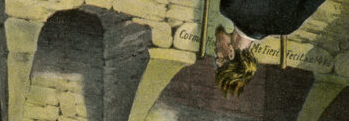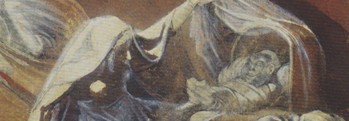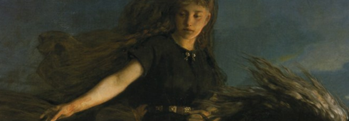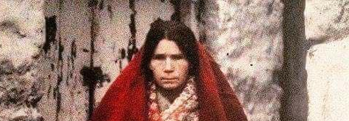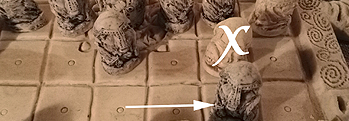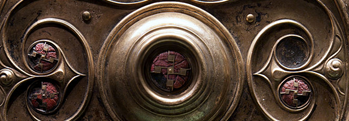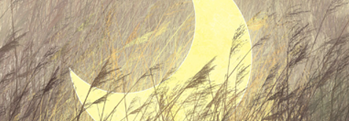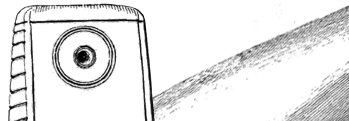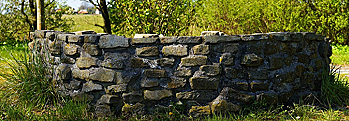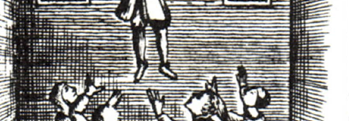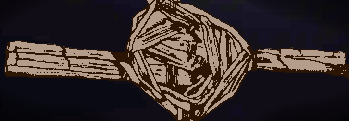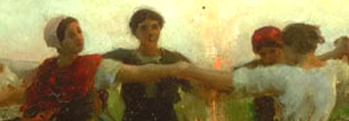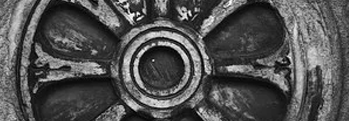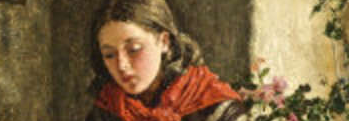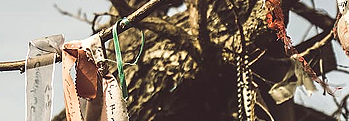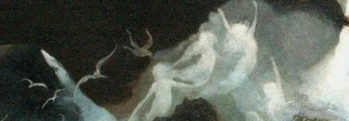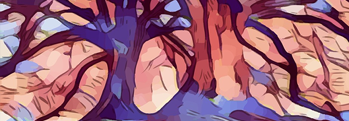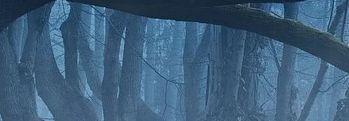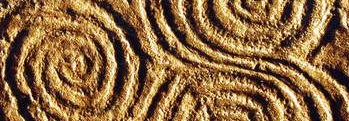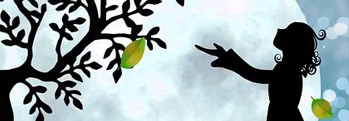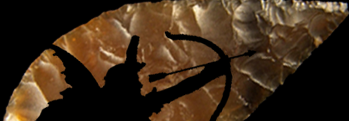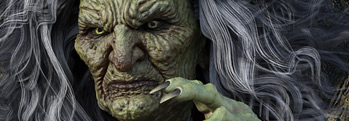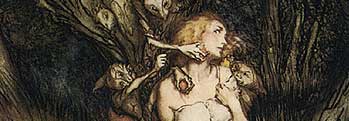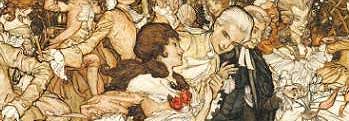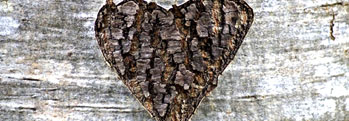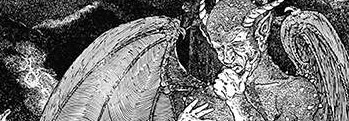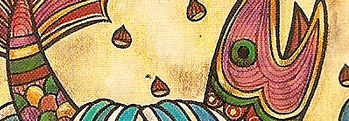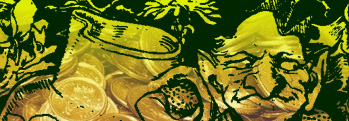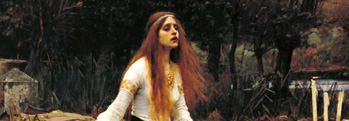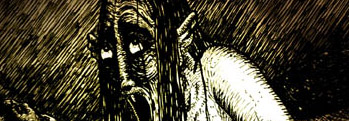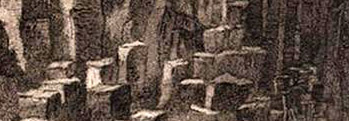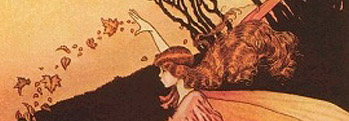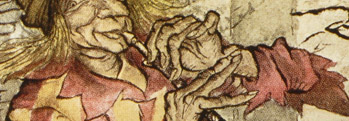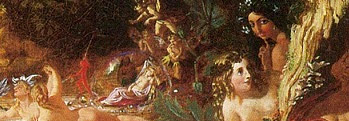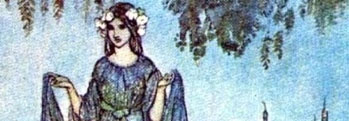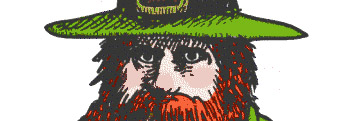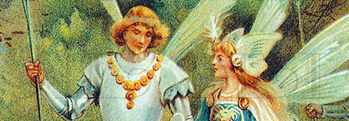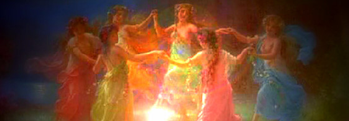Irish Moon Knots
Irish and Celtic myths and legends, Irish folklore and Irish fairy tales tales of Ireland
The ties that bind
 The tying of elaborate knots to bind a wish or curse is an ancient practise in Ireland. The followers of Manannan, lord of the waters, were reputed to tie reeds into eldritch shapes and cast them into bogs as an offering. Different knots had different spiritual meanings, as with the St Bridgit’s cross, rushes woven into a Christian icon. Our famously beautiful Celtic knotwork may even be an expression of this tradition!
The tying of elaborate knots to bind a wish or curse is an ancient practise in Ireland. The followers of Manannan, lord of the waters, were reputed to tie reeds into eldritch shapes and cast them into bogs as an offering. Different knots had different spiritual meanings, as with the St Bridgit’s cross, rushes woven into a Christian icon. Our famously beautiful Celtic knotwork may even be an expression of this tradition!
Druids in earlier times would croon strange melodies under the sickle moon as they worked spells and incantations, spirits and even storms into their knots with careful and cunning fingers, but of that the wise will say no more, although some may whisper of serpent-ways and converse with, or even worship of the wyrms of old.
Belief in this sort of thing persisted for long and long throughout Ireland, some say even to the present day. For the piseóg or word of the curse was closely linked to súgán ropes, which are a kind of straw rope you may have seen used to make the seats of chairs or beds in old cottages. The word súgán also means weakness, as a term of contempt, and sometimes a woven straw doll was used instead, particularly in the south of the country.
This rope would bring together the ingredients of the curse, and woe betide any who broke the bonds in an unfitting manner.
But not for malevolent purposes alone were knots tied, for the Parshell cross was meant to keep the dead from your door at Hallowe’en, being two lengths of rowan wood tied with red thread and wheaten straw according to a certain ancient pattern.
These kinds of bindings were collectively known as bhuarach, or cow-ties, and were traditionally used to keep cows from kicking and wandering while they were being milked. Witches, it was said, would make bhuarach from the hair of cows’ tails and use it to magically steal the milk and good luck from a farmer.
This was done by boiling the hair and then twisting it very hard into a rope with an eye at each end, through which a small stick or bone called a buairicín was pushed. There are accounts of women seen in farmers fields going around with a bhuarach and bucket collecting a hair from each cow or milking one cow from each local farmer as well as collecting the morning dew from the farmers’ fields.
The farmer himself might make one and take it to church to receive a blessing from the priest, especially on Palm Sunday and on Bealtaine or May Day morning to help milk their cattle. If a witch could steal that, I’ll tell you the farmer was in trouble!
The witch would make milking motions with it and chant wicked curses to drive away the farmer’s good luck or steal all his milk.
Of an even more sinister sort was the buarach bháis, or the binding of the dead. Reputable accounts tell that workers of the dark arts would make a cord from “an unbroken hoop of skin cut with incantations from a corpse across the entire body from shoulder to footsole and wrapped in silk of the colours of the rainbow and used as a spancel to tie the legs of a person to produce certain effects of witchcraft,” or so claimed the redoubtable Father Dinneen in the eighteenth century.
It had been made from the illegitimate daughter of Sir Henry Lynch-Bloss at the instruction of his jilted mistress Sibella Cottle, the jilted mistress. This was then meant to be tied around the head of the man a woman wanted as a husband and called a boghain a bhfasgaí, or ring of service.
It could also be worn as a belt to change one’s own shape or that of others, among other strange properties. Some of the bog bodies which have been recovered from their aeons-old resting places have such cords tied around their necks.
Stories tell of parish priests finding these strips of skin even into the twentieth century and burning them publicly after Mass!
Read now the tale of the death-spancel, which means in English that very same thing as the buarach bháis...
High up among the dusty rafters of Aughagree Chapel dangles a thin shrivelled thing, towards which the people look shudderingly when the sermon is of the terrors of the Judgment and the everlasting fire. The woman from whose dead body that was taken chose the death of the soul in return for a life with the man whom she loved with an unholy passion. Every man, woman, and child in that chapel amid gray miles of rock and sea-drift, has heard over and over of the unrepentant deathbed of Maureen Houlihan.
They whisper on winter nights of how Father Hugh fought with the demons for her soul, how the sweat poured from his forehead, and he lay on his face in an agony of tears, beseeching that the sinner whom he had admitted into the fold of Christ should yet be saved. But of her love and her sin she had no repentance, and the servants in Rossatorc Castle said that as the priest lay exhausted from his vain supplications, and the rattle was in Dark Maureen's throat, there were cries of mocking laughter in the air above the castle, and a strange screaming and flapping of great wings, like to, but incomparably greater than, the screaming and flapping of the eagle over Slieve League. That devil's charm up there in the rafters of Aughagree is the death-spancel by which Dark Maureen bound Sir Robert Molyneux to her love.
It is of such power that no man born of woman can resist it, save by the power of the Cross, and 'twas little Robert Molyneux of Rossatorc recked of the sweet Christ who perished that men should live—against whose Cross the demons of earth and the demons of air, the malevolent spirits that lurk in water and wind, and all witches and evil doctors, are powerless.
But the thought of the death-spancel must have come straight from the King of Fiends himself, for who else would harden the human heart to desecrate a new grave, and to cut from the helpless dead the strip of skin unbroken from head to heel which is the death-spancel? Very terrible is the passion of love when it takes full possession of a human heart, and no surer weapon to the hand of Satan when he would make a soul his own. And there is the visible sign of a lost soul, and it had nearly been of two, hanging harmlessly in the rafters of the holy place.
A strange thing to see where the lamp of the sanctuary burns, and the sea-wind sighs sweetly through the door ever open for the continual worshippers.
Sir Robert Molyneux was a devil-may-care, sporting squire, with the sins of his class to his account. He drank, and gambled, and rioted, and oppressed his people that they might supply his pleasures; nor was that all, for he had sent the daughter of honest people in shame and sorrow over the sea. People muttered when they heard he was to marry Lord Dunlough's daughter, that she would be taking another woman's place; but it was said yet again that it would be well for his tenants when he was married, for the lady was so kind and charitable, so gentle and pure, that her name was loved for many a mile.
She had never heard the shameful story of that forlorn girl sailing away and away in the sea-mist, with her unborn child, to perish miserably, body and soul, in the streets of New York. She had the strange love of a pure woman for a wild lover; and she thought fondly when she caressed his fine, jolly, handsome face that soon his soul as well as his dear body would be in her keeping: and what safe keeping it would be.
Sir Robert had ever a free way with women of a class below his own, and he did not find it easy to relinquish it. When he was with the Lady Eva he felt that under those innocent, loving eyes a man could have no desire for a lesser thing than her love; but when he rode away, the first pretty girl he met on the road he held in chat that ended with a kiss.
He was always for kissing a pretty face, and found the habit hard to break, though there were times when he stamped and swore great oaths to himself that he would again kiss no woman's lips but his wife's—for the man had the germ of good in him.
It was a fortnight to his wedding day, and he had had a hard day's hunting. From early morning to dewy eve they had been at it, for the fox was an old one and had led the dogs many a dance before this. He turned homeward with a friend, splashed and weary, but happy and with the appetite of a hunter. Well for him if he had never set foot in that house.
As he came down the stairs fresh and shining from his bath, he caught sight of a girl's dark handsome face on the staircase. She was one of the servants, and she stood aside to let him pass, but that was never Robert Molyneux's way with a woman. He flung his arm round her waist in a way so many poor girls had found irresistible. For a minute or two he looked in her dark splendid eyes; but then as he bent lightly to kiss her, she tore herself from him with a cry and ran away into the darkness.
He slept heavily that night, the dead sleep of a man who has hunted all day and has drunk deep in the evening. In the morning he awoke sick and sorry, a strange mood for Robert Molyneux; but from midnight to dawn he had lain with the death-spancel about his knees.
In the blackness of his mind he had a great longing for the sweet woman, his love for whom awakened all that was good in him. His horse had fallen lame, but after breakfast he asked his host to order out a carriage that he might go to her. Once with her he thought all would be well. Yet as he stood on the doorstep he had a strange reluctance to go.
It was a drear, gray, miserable day, with sleet pattering against the carriage windows. Robert Molyneux sat with his head bent almost to his knees, and his hands clenched. What face was it rose against his mind, continually blotting out the fair and sweet face of his love? It was the dark, handsome face of the woman he had met on the stairs last night. Some sudden passion for her rose as strong as hell-fire in his breast.
There were many long miles between him and Eva, and his desire for the dark woman raged stronger and ever stronger in him. It was as if ropes were around his heart dragging it backward. He fell on his knees in the carriage, and sobbed.
If he had known how to pray he would have prayed, for he was torn in two between the desire of his heart for the dark woman, and the longing of his soul for the fair woman. Again and again he started up to call the coachman to turn back; again and again he flung himself in the bottom of the carriage, and hid his face and struggled with the curse that had come upon him. And every mile brought him nearer to Eva and safety.
The coachman drove on in the teeth of the sleet and wondered what Sir Robert would give him at the drive's end. A half-sovereign would not be too much for so open-handed a gentleman, and one so near his wedding; and the coachman, already feeling his hand close upon it, turned a brave face to the sleet and tried not to think of the warm fire in the harness-room from which they had called him to drive Sir Robert.
Half the distance was gone when he heard a voice from the carriage window calling him. He turned round. “Back! Back!” said the voice. “Drive like hell! I will give you a sovereign if you do it under an hour.” The coachman was amazed, but a sovereign is better than a half-sovereign. He turned his bewildered horses for home.
Robert Molyneux's struggle was over. Eva's face was gone now altogether. He only felt a mad joy in yielding, and a wild desire for the minutes to pass till he had traversed that gray road back. The coachman drove hard and his horses were flecked with foam, but from the windows Robert Molyneux kept continually urging him, offering him greater and greater rewards for his doing the journey with all speed.
Halfway up the cypress avenue to his friend's house a woman with a shawl about her head glided from the shadow and signalled to the darkly flushed face at the carriage window. Robert Molyneux shouted to the man to stop. He sprang from the carriage and lifted the woman in. Then he flung the coachman a handful of gold and silver. “To Rossatorc,” he said, and the man turned round and once more whipped up his tired horses. The woman laughed as Robert Molyneux caught her in his arms. It was the fierce laughter of the lost. “I came to meet you,” she said, “because I knew you must come.”
From that day, when Robert Molyneux led the woman over the threshold of his house, he was seen no more in the usual places of his fellow-men. He refused to see any one who came. His wedding-day passed by. Lord Dunlough had ridden furiously to have an explanation with the fellow and to horsewhip him when that was done, but he found the great door of Rossatorc closed in his face. Every one knew Robert Molyneux was living in shame with Maureen Houlihan.
Lady Eva grew pale and paler, and drooped and withered in sorrow and shame, and presently her father took her away, and their house was left to servants. Burly neighbouring squires rode up and knocked with their riding-whips at Rossatorc door to remonstrate with Robert Molyneux, for his father's sake or for his own, but met no answer. All the servants were gone except a furtive-eyed French valet and a woman he called his wife, and these were troubled with no notions of respectability.
After a time people gave up trying to interfere. The place got a bad name. The gardens were neglected and the house was half in ruins. No one ever saw Maureen Houlihan's face except it might be at a high window of the castle, when some belated huntsman taking a short-cut across the park would catch a glimpse of a wild face framed in black hair at an upper window, the flare of the winter sunset lighting it up, it might be, as with a radiance from hell.
Sir Robert drank, they said, and rack-rented his people far worse than in the old days. He had put his business in the hands of a disreputable attorney from a neighbouring town, and if the rent was not paid to the day the roof was torn off the cabin, and the people flung out into the ditch to rot.
So the years went, and folk ever looked for a judgment of God on the pair. And when many years were over, there came to Father Hugh, wringing her hands, the wife of the Frenchman, with word that the two were dying, and she dared not let them die in their sins.
But Maureen Houlihan, Dark Maureen, as they called her, would not to her last breath yield up the death-spancel which she had knotted round her waist, and which held Robert Molyneux's love to her. When the wicked breath was out of her body they cut it away, and it lay twisted on the ground like a dead snake. Then on Robert Molyneux, dying in a distant chamber, came a strange peace. All the years of sin seemed blotted out, and he was full of a simple repentance such as he had felt long ago when kneeling by the gown of the good woman whom he had loved. So Father Hugh absolved him before he died, and went hither and thither through the great empty rooms shaking his holy water, and reading from his Latin book.
And lest any in that place, where they have fiery southern blood in their veins, should so wickedly use philtres or charms, he hung the death-spancel in Aughagree Chapel for a terrible reminder.
The household of Henry Lynch-Bloss in Balla is marked on the map below.
Further Folk and Faerie Tales of Ireland
A beautiful new font has been developed which allows you to type in Ogham on your computer! Dustin A. Ashley in association with Dr. Adam Dahmer are pushing the boundaries of Gaelic culture outwards into new and exciting territory, read on to learn more: "Within Gaelic culture, there is a long-standing tradition where lang ... [more]
One of the rarest and most beautiful woods in the world is Irish bog oak. This very ancient kind of wood can be found across Ireland, but is most often recovered from deep peat bogs in the midlands, and can be anywhere from three thousand to eight thousand years old or more. These trees grew, lived and fell in times of legend, witnessing the rise o ... [more]
The gift of the gab, as it’s known, is a common thing among the Irish – being able to talk all day about anything and everything, and do it in a way that would have you listen as well. It’s as Irish as red hair and freckles. But what if you didn’t have the gift of the gab, or felt a deficiency of gabbiness? Never fear, al ... [more]
Once upon a time in County Kerry, there lived a wealthy farmer and his wife, blessed in every way with the exception of only one – they had no children. They put a brave face on it, but with every year passing they grew older and their hopes grew colder, although the ember never quite faded. So you can imagine their delight when finally, a ... [more]
Michael O’Guggin from Cahir Cam was the only son of a small farmer in County Cork, and his family loved him well, so to keep him from getting on the boat to America with all of his friends, they signed over the farm to him and married him to a lovely girl at what we would consider a very young age these days, And yet although he had grown ... [more]
Long ago in the Eyeries in County Cork, there lived a wise woman by the name of Máire Ní Mhurchú, which was Mary Murphy in English. Now when I say a wise woman, I don’t mean she was a woman wise in old sayings and folksy ways – although she had no shortage of those either – I mean she was a bean feasa, one of ... [more]
We are delighted to be able to present to you the rules of Fidchell, the Irish game of kings! This game can be purchased, but it's easy to get started and try it out for yourself. All you need is a 7 x 7 board, which can be squares or pins marked out - even on paper - 16 white or attacker pieces, a king piece, and 8 darker-coloured defender pie ... [more]
The Autumn equinox was considered to be a day of great importance by the ancient Irish, especially for the first farmers who arrived and built the great megalithic civilisation. Numerous ancient monuments are aligned to both the spring and Autumn equinoxes, such as those at Loughcrew, and we can easily imagine ancient druids or magicians enacti ... [more]
The Spring equinox was a very important time for the people of ancient Ireland, heralding as it did the end of the dark season with all of its dangers and want, and signalling the dawn of a new year of plenty. The day and night, the light and the dark side of the year were in equal balance, neither stronger than the other, and it is easy to ... [more]
The winter solstice is the shortest day of the year, and the people of old Ireland called it Grianstad, or the day of the stopped sun. The solstice festival and celebrations date back at least six thousand years, but may go even further back - we can guess their age for them because many of the megaliths constructed by the Neolithic Irish are a ... [more]
War and the arts of war much occupied the people of Ireland, who became renowned for their skill with weapons and in the ways of battle. They fought one another and the many invaders who came to this land, earning not only fame for their arms and the swords and spears they carried, but for their shields as well! Some of the most legended shields ... [more]
There was never much call for police back in the old days in Ireland – everyone knew everyone else in the area and everyone knew what everyone else had done! While there were ups and downs to it, if someone was caught doing something particularly bad, they would be ashamed to meet anyone’s eye, and would eventually leave the area, head ... [more]
Our Irish ancestors from olden times were fascinated with the sky and its inhabitants, how they moved, what they meant and where their celestial lives intersected with our own. The Tuatha Dé Danann loved the sun foremost but others built places aligned to the movements of the moon and stars, many of which predate the solar structures. The ... [more]
From the earliest times in Ireland the tiny native wren has been regarded with respect as the wisest bird of all, who outsmarted the eagle to become the king of the birds of Ireland. Indeed some believe that its name in Irish, dreoilín, means trickster. The craftiness of this little bird was how it got its crown, for the king of all the b ... [more]
The Stonemen of Ireland were once a great tradition throughout the country, a tradition that reached back to the earliest antiquity of the nation. And yet if you ask what a Stoneman might be today, very few if any will be able to give you the answer! It might be found yet in the Aran Islands in the furthest west, but not many other places. Mille ... [more]
The tying of elaborate knots to bind a wish or curse is an ancient practise in Ireland. The followers of Manannan, lord of the waters, were reputed to tie reeds into eldritch shapes and cast them into bogs as an offering. Different knots had different spiritual meanings, as with the St Bridgit’s cross, rushes woven into a Christian icon. Our ... [more]
Long ago in Ireland, although not so long that a wide oak might not remember, there lived in county Roscommon a farmer by the name of Donal O’Leary. Now Donal was known far and wide as a crafty fellow, or cute as we say in Ireland, and a skilled hand with the cards to boot, but he made one mistake – he played cards with the two farmers ... [more]
The mightiest heroes and warriors of ancient Ireland understood well that the greater part of battles were fought in the hearts and minds of men and women. A tired and bloodied warrior may fight like a cornered wolf if his courage is up, while a well fed and rested champion may sag in dismay at the touch of fearful sorrow. This was a different m ... [more]
A king in Ireland asked his daughters whom they wanted to marry. The oldest wanted the king of Ulster, the second the king of Munster, and the youngest the Brown Bear of Norway. That night, the youngest princess woke to find herself in a grand hall, and a handsome prince on his knees before her, asking her to marry him. They were married at once ... [more]
The fairy tales and legends of Ireland are bound into her very soil and seed, and few more so than the humble ragwort, the Buachalán Buíde! This plant was known as the fairy horse, and little children were warned not to touch it for fear they would be spirited away by the fairies on their yellow horses. Stories were told up and ... [more]
Hares in Ireland have long been seen as mysterious creatures, deeply connected to the otherworld and the subject of legend, song and story. Their association with the realms of the fairies and good folk led the old Druids to capture and release them in a place with many openings, such as a stone circle, to see which way they would run. Then the Dru ... [more]
Once in Ireland, somewhere around the south and east of the country near the old kingdom of Osraí, there lived a young farmer by the name of Connor. He had a small herd but a good one, of strong stock and unblemished, but one morning he arose from his bed before the dawn, as was his custom, and noticed that two of them were missing! This ... [more]
Hazel trees, or the crann coill, are among the most important trees in Irish mythology and folklore. They are associated with wisdom and authority, and in old English the word "haesl" means "rod of power". The druids would often choose to carry a hazel wand over an oaken staff, and so respected as chieftain trees were they that ... [more]
It took the fancy of one of the gentry, who lived near to the Earl of Orrery’s seat, to play cards with his friends one day, so he sent his butler to purchase a new deck of cards. However as the man passed an old mound he paused in surprise, for what was waiting for him but a table loaded with good cheer and a fine company making merry! Cu ... [more]
You will know the cursed place by these three tokens – an elder tree, a lonesome calling corncrake, and thickets of nettles. Should a traveller see, smell and hear these signs they would know to turn around quick and hurry back the way they had come, before something unpleasant took an interest in them! The Irish made cursing into an art f ... [more]
There is a kind of cross, not unlike the much more famous St Brigid's cross, which can only be made on Hallowe'en or Samhain as it used to be known. It could be hung inside the front door, in the thatch or elsewhere within the house, and it was reputed to offer protection from bad luck, sickness, curses and the fairy folk who might be up to ... [more]
The ancient Irish festival of Samhain, or as we know it today, Hallowe'en, is rooted deep in the very bedrock of Ireland, among the customs of those who first arrived here when the great ice withdrew. On this advent of the darkest time of the year they imagined their worst fears coming true, the dead walking and evil spirits hovering outside th ... [more]
The majestic Irish wolfhound, known as the Cú Faoil in Irish, famed in history and mythology, is one of the largest and strongest dog breeds in the world. It is certainly is one of the tallest, reaching over seven feet in height when standing on its hind legs! As it was known in ancient times, the great Irish hound was held in such high r ... [more]
Of all the many plants trees, shrubs and green growing things in Ireland, there are few as closely woven into Irish mythology as the holly, or Cuileann. It was seen by the old people as one of the noble trees, and it was never cut down completely, although sprigs were often taken for the decoration and protection of homes. Some would ask permission ... [more]
Lughnasa means “the gathering of Lugh” the many-gifted, who was once a leader of the Tuatha Dé Danann. In times we know only from myth and legend, this festival was celebrated for the two weeks leading up to the cross-quarter date, which might have been anywhere from the first to the fourteenth of August, and for two weeks afterw ... [more]
The month of July was known for the past several centuries in Ireland as the hungry month, since that was when the food from last year's harvest began to run out or had spoiled. The ability of the typical Irish household to store food and save money to buy more was at its lowest by the middle of the nineteenth century, even before the great hun ... [more]
Although it is less celebrated these days, the midsummer festival used to be an important occasion in Ireland, going back many centuries, far into ancient times. Even as lately as fifty years ago half the streets in Ireland would have their own bonfire, or more properly bone fire, since the Irish word for “bonfire” is tine cnaimh. The b ... [more]
The crane is one of the largest birds you might encounter, and once it was common throughout Ireland. Sadly cranes left these shores more than three centuries ago, so a nesting pair being spotted recently is cause for celebration! They were making their new home on a rewetted raised peat bog, one of many being returned to the wilderness in Irela ... [more]
Back in the olden days when fairies were more often seen than they are today, whether that was because there were more people in the countryside or there was more countryside, farmer Purcell rented a few acres in Mourne near Mallow in Cork, as his means allowed. Those means didn't allow much, sad to say, for his plot was poor and barren. Lik ... [more]
When the spring turns to summertime in Ireland, a carpet of golden yellow rolls out under drumlin skies across the wild places to greet the changing seasons, the exuberant growth of the gorse, which some call whinn, broom or furze, although in the old language it's known as Aiteann, which means “sharp”. And well named it is, for the ... [more]
May is a magical month in more ways than one! The beginning of May marked one of the cross quarters of the year, when the world grew thin in certain places, as the old folks used to say, and the Sidhe and other spirits could travel over and back between our world and theirs. The exact date wanders from year to year mind you, sometimes earlier, some ... [more]
The author of the Long Black Hand was a man called Richard Cronnolly, born in Ballinderreen County Galway in 1828. He spent his spare time in the record office where he studied old documents. Although he was not a wealthy man and had no help from anyone, he found a publisher just before he died at the very young age of thirty five. The Long Blac ... [more]
Not all that long ago there lived a decent family on the border of Tipperary, Michael Flannagan and Judy his wife were the two that were in it. Although they were not blessed with wealth, they were blessed with children, four sons to be exact. Three of these lads were as fine and stout a trio as you'd ever hope to see, and it was enough to m ... [more]
One of the many ancient Irish traditions whose origin has been lost to the ever-deepening mists of time is that of the wishing tree. They were also called rag trees, raggedy bushes, or clooty or cloughtie trees, and they can often be found growing next to or near holy wells and springs. When people gathered around the old turf fires in Ireland, ... [more]
The Sceach Geal is a tree that grows in Ireland and throughout the north of the world and its name means “bright thorn” or moon thorn. It was known in Brehon law as an Aithig fedo or a Commoner of the Wood, a quickthorn like its ferocious cousin the blackthorn, and it is also called hawthorn, the gentle bush, the lone thorn, the May tre ... [more]
Throughout Ireland can be found many holy wells and blessed springs, most of which predate the arrival of Christianity on the island, but which were consecrated by the Church to the service of Christ. Within some of these wells and deepnesses, the old legends tell, swim sacred guardians and fish of strange repute! To this day the people of Irela ... [more]
Lough Gur is a place of great antiquity and the source of many strange rumours and legends, surrounded by misty forests and low rolling hills, not all of which are natural in origin! Once there was an island in the middle of the lake, but now it is a peninsula, and it is joined to the eastern shore by a causeway, not far from the village of Aney ... [more]
There was a farmer in County Kerry who had a nice little cottage for himself and his wife, but the thatched roof was in a terrible state of disrepair and unlikely to last another winter. Unlike the stone houses and cottages in the west, Kerry cottages were less sturdy, and so he knew he had to build himself another place to live. He searched thr ... [more]
Long ago in Ireland, at the dawn of the Christian age, Irish monasteries and schools were famed throughout Europe and the world for the depth of their knowledge and the quality of the education they gave to princes, lords and nobles who travelled from all parts to attend them. One of the most famous early Christian theologians who taught in thes ... [more]
The people of Ireland before the time of Saint Patrick had many strange customs, and some of these survive even to this very day, often mixed and combined with Christian rites and beliefs! One of those traditions was the sunwise walk. What this meant was, in order for good luck to attend an event, you had to walk around it sunwise or deiseal, pr ... [more]
We have a saying in Ireland, that it's the only place in the world where you can get all four seasons in the one day – well there's truth in that, but Irish weather can be even stranger than most people realise! So it is with the Gaoth Sidhe, which means “the fairy wind,” and is pronounced “gwee sheeha”. Oft ... [more]
One upon a time in Ireland, in the farthest west of County Clare, there lived a brave young chieftain whose name was O'Quinn. A kindly enough man was he, and fair to behold, of ruddy locks and clean limbs, and he made his Dún on a flat plain near to a clearwater spring, the purest in all of Ireland and perhaps all the world. He was co ... [more]
Cursing of various sorts has a history as long and rich as Ireland's own, stretching from the very earliest tales of the first settlers in Ireland all the way to the modern day. Whether a quick muttered malediction on someone who had crossed you or an elaborate, lengthy poem intended to satirise and ruin the legacy of a king, the mallacht, or c ... [more]
Much has been said but little written of the old Irish piseóg, the word of the curse. Now the same term is often used to refer to general traditions and superstitions in Ireland, things like if you're ever lost, turn your socks inside out to find your way home, or opening the back door if you hear a knock at the front door, to let the fa ... [more]
There's a common misconception some might have about fairies, which is the idea that fairies are nice friendly little spirits, trailing pixie dust and turning pumpkins into luxury vehicles. As any of the old folk of Ireland could tell you, nothing could be further from the truth, for a fairy in wrath is more dangerous than a hive of wasps or a ... [more]
Sometimes when out and about travelling the lesser known byways of Ireland, you might come across a little stone arrowhead or piece of flint shaped by hands long gone, and people would tell you not to touch it for fear it might carry the tinneas sióg, the sickness of the fairy mounds! For it was that fairies, the sidhe, were known to hurl ... [more]
The sinister crone of the woods, the wishing thorn, there are as many tales told of the blackthorn trees of Ireland as there are spiky thorns on its branches. The people who came before, whose blood still runs in some, planted them around their tombs and sacred places and bound the lunantisidhe, or moon fairies to protect them, save only on the ful ... [more]
Once upon a time there was a poor woman with three daughters, and one day the eldest decided to seek her fortunes in the world. “Mother,” she said, “bake me a cake and kill my chicken, for I am away to the wide world.” And so her mother did just that, and when all was ready, her mother asked “which will you have ... [more]
A fair witch crept to a young man's side, And he kissed her and took her for his bride. But a shape came in at the dead of night, And filled the room with snowy light. And he saw how in his arms there lay A thing more frightful than words may say. And he rose in haste, and followed the Shape Till morning crowned an eastern cape. ... [more]
Once upon a time, not so long ago, a lovely young couple had just gotten married in the Irish countryside. It was a wonderful ceremony and all had remarked on how beautiful the bride looked, when suddenly their festivities and dancing were interrupted by the groom, who rushed into the crowd shouting that his Margaret was missing! Well they ... [more]
They do say that once upon a time, long ago, there lived a lady of great beauty in a castle on a lake, and her hair was fair as gold, shining in the summer sun. She had been promised to a king's son, the lord of a nearby kingdom, but as he was coming to see her one dark November evening, who should come upon him but the warriors of a jealous lo ... [more]
One evening in late November, which is the time of year when the spirits of Ireland have the most power, the prettiest girl in all the land was going to the ancient well for water. Then, as chance would have it, her foot turned on a loose stone, and she fell. It was bad luck, but when she got back to her feet, it seemed as though she was in a stran ... [more]
Baile the son of Buan was renowned through Ulster and all of Ireland for his tale-telling, and loved for his his kindly nature, but most of all by by Aillinn, daughter of Lughaidh. From afar they shared sweet messages and poetry, and as time passed she grew to love him more and more, and he in kind. Everyone spoke well of them and looked forward to ... [more]
In the olden days there was a man who played the pipes, but he was not famous for it, or if he was it was for the wrong reasons, since he had but the one tune, a jaunty jig called The Black Rogue. Now it happened one dark night that he was on his way home after entertaining the gentlemen, and with a few pence in his pocket and a few drinks under hi ... [more]
Times were hard in Ireland back years ago, and while some might say they've had it tough today, it was not a patch on the hardships people endured in times gone by. And so it was with Michael McGovern, a poor farmer with hardly an acre of stony soil to rent, who looked upon his three young sons with love for the life of them and fear for their ... [more]
There was a prince in Ireland a long, long time ago, back when Ireland still had princes, and O'Donall was his name. A brave fellow he was, and powerful, but given to risk and heedless thrills in his hunting and leaping and running and swimming, all the better to impress his friends. He was lord of a wide land, and he wasn't hard on the poo ... [more]
A woman was out one day looking after her sheep in the valley, and coming by a little stream she sat down to rest, when suddenly she seemed to hear the sound of low music, and turning round, beheld at some distance a crowd of people dancing and making merry. And she grew afraid and turned her head away not to see them. Then close by her stood a you ... [more]
They say that in Ireland you will enjoy all four seasons in a day, but on this day the four seasons were high and glorious summer, or so it seemed to Tom Fitzpatrick as he walked along a narrow road between two tall hedges in harvest time. As he walked, he chanced to hear a strange ringing like a tiny bell, and he paused, puzzled as to what it migh ... [more]
Connla of the Fiery Hair was one of the sons of Conn of the Hundred Battles, and his favourite son, a swift and agile warrior with a voice that could make the mountains tremble. Himself and his father climbed the heights of Usna on Samhain, when he saw coming towards them a slender maiden of great beauty, clad in strange clothes. “Where do ... [more]
Strange are the ways of the Fairies of Ireland, and strange the look about them, but for all their wild and untamed manner they follow rules written in the ripples of willow-branches on still ponds, and laws murmured by the echo of birdsong in deep wells. Once there was a woman sitting in her cottage, a humble enough abode, and she was making wo ... [more]
There are many types of fairy in Ireland, some more risky than others, and some to be avoided due to their habits rather than out of any particular malevolence. Such a one is the Gan Ceanach, whose name means “Without Love”. Although you might think such a title would indicate a friendless creature of a lonely nature lacking in socia ... [more]
There are a great many raths or fairy forts of old scattered throughout Ireland today, numbering in the tens of thousands, and it is here, the wise say, that the good people or fairy folk gather to hold their revels. Nobody would dare to cross, let alone build on a fairy dwelling in the past, marking as they did the boundary between our civilise ... [more]
Near to the town of Fermoy in Ireland lies the great stack of Cairn Thierna, not as wide about nor as tall as some mountains perhaps but feared and respected by the local people nonetheless. For all around it and along its flanks are tall heaps of stones they say are the work of the fairy folk, or the old people who lived here long ago. And you ... [more]
On the road going down to Cork there's an old set of four walls that used to once be called Ronayne's Court. Although there's little enough to see of it nowadays still the stack of the chimneys stands proud, and on it can be seen the coat of arms of the family that built it and used to live there. They were a fine couple and had one ... [more]
It was known in times past in Ireland that there were men and women who could talk to the fairies, ask favours from them, and even live among them, and some used this acquaintance to work their will on the world, for good or for ill. Most famous, perhaps, among these people were the fairy healers of old. Biddy Early is the best known of their ki ... [more]
James Mac Neill was as strapping a young fellow as you could hope to meet, and likely with it. Never did he walk away from a tussle or a drink, and never far from his hand was his shillelagh. He had no fears save the lacking of a pint, no cares except for who would pay for it, and not a thought in his head but how to have fun after it. One cold ... [more]
Maurice Mulreaney was well known for travelling about the countryside without fear of anything living or otherwise, as quick to cross a graveyard or fairy mound as you or I would be to cross the street, for he didn't believe in that which he couldn't see with his own two eyes or touch with his own two hands, and he didn't bother with ol ... [more]
It wasn't a bad life for Fergus O'Hara in Owenmore, for all that himself and his wife Rose had little, the little they had was enough for them. Some goats, pigs and poultry ranged far and wide about their few acres, and a field of oats and potatoes kept them busy for the harvest and brought in a few pennies. It so happened that there lay ... [more]
The children of De Danann once ruled the island of Ireland, before they departed back to their own lands in the farthest west or went below the earth in their fairy mounds to dance and sing forevermore, but if you're lucky – or unlucky! – you might still come across them in the wild places and those deep forests yet untouched. An ... [more]
Some of the Sidhe in times of old would take a fondness for one particular family, protecting it and helping it rise in the world, and so it was with the O'Briens, who were known as the Dál gCais, or the Dalcassians. Their fairy guardian was called Aoibhell, whose name means burning ardour or beauty, depending on who you ask. She had ... [more]
Irish legends from time immemorial have a great deal to say about the land of the fairies, the home of the Tuatha De Danann, or the world of the Sidhe. There are those who claim it lies beneath fairy mounds or on the other side of deep caves where Druids once held tryst and shared magical secrets, while other tales tell of heroes and adventurers, e ... [more]
It's well known among those who know of such things that fairies love to dance more than anything else, and they take it ill should anything interfere with their merriment. And if someone wanted to spoil a dance, they could come up with few better ways of doing so than to send a herd of cattle wandering through! The hill atop Knockshegowna w ... [more]
The cheerful Leprechaun is about as well known an emblem of Ireland as you could want, but what truth lies behind the stories? Well the truth is nobody really knows the truth, for leprechauns are are a cagey bunch at the best of times, not prone to gossip or holding forth on the important events of the day or the local hurling results, even after a ... [more]
After the Tuatha De Dannan were defeated in battle by the great race of Milesians, who held sway in Ireland long after, some of the Tuatha decided to leave and go elsewhere while some chose to stay in Ireland. Those that stayed agreed that they must live beneath the earth, and they were led by a great King in the west, Finnbhear son of Dagda, who i ... [more]
The Pooka or Puca is one of the most ancient fairy creatures of Ireland, and is known further abroad as well, called Puck or Pook. In some places he is feared and in others respected. He can take many shapes, most commonly that of a wild horse wrapped in chains with sulfurous or blazing crimson eyes - the night mare - a huge dog, a raging bull, a h ... [more]
Some might wonder, who or what are the fairy folk? There are stories upon stories of them and their doings in many places, but most of all in Ireland, where it was said they lived longest and if they still walk the earth, where they can yet be found! The country folk claim they are fallen angels lacking the merit to stay in heaven while being kindl ... [more]





